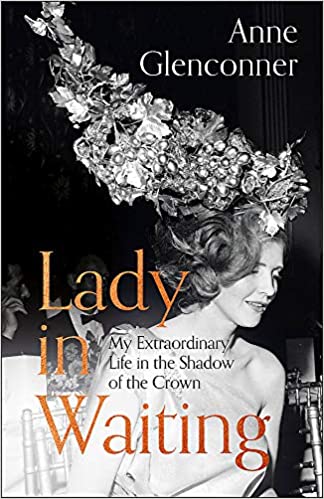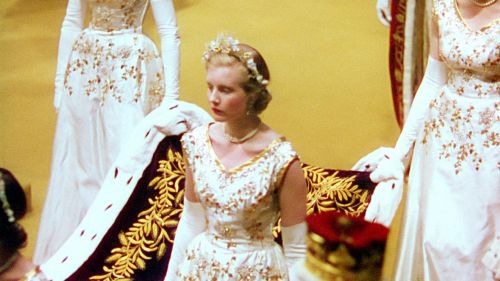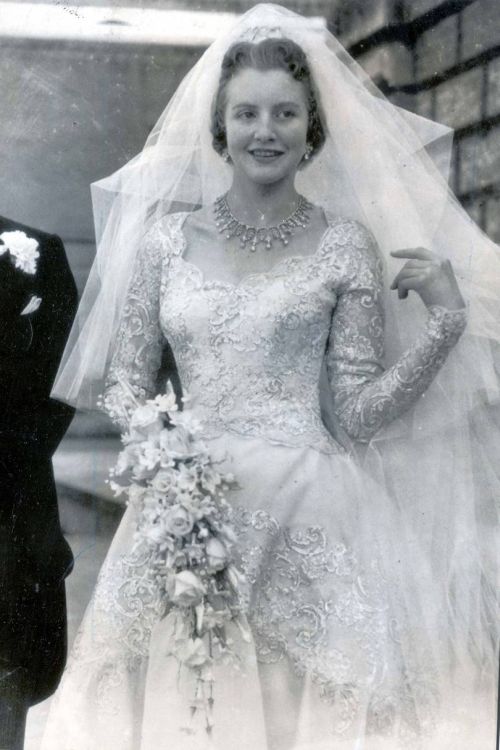Lady in waiting – my extraordinary Life in the Shadow of the Crown
By Lady Anne Glennconner. Review by Rose.
 Lady Glennconner’s story of her life is the recounting of an outrageous spirited palette of memories, glamorous partying, comic goings-on and her turbulent experiences as a wife championing a husband prone to hysterics with a weakness for wearing theatrical costumes. She gives an insight into gender positions and power roles of the sexes in the 1950s onwards. She discusses child caregiving practices of mothers in the upper ranks of society and describes thrilling life instants, like being maid of honour to the Queen's inauguration. She also shares tragic times, of a son dying of aids, and her sadness at the loss of her close friend, Princess Margaret.
Lady Glennconner’s story of her life is the recounting of an outrageous spirited palette of memories, glamorous partying, comic goings-on and her turbulent experiences as a wife championing a husband prone to hysterics with a weakness for wearing theatrical costumes. She gives an insight into gender positions and power roles of the sexes in the 1950s onwards. She discusses child caregiving practices of mothers in the upper ranks of society and describes thrilling life instants, like being maid of honour to the Queen's inauguration. She also shares tragic times, of a son dying of aids, and her sadness at the loss of her close friend, Princess Margaret.
This is a story of a child born into privilege, growing up under the austere backdrop of a colossal country estate. There are traditions handed down that steered the lives of the Glennconner family. The girls didn’t inherit the family estates, however, they could guarantee a marriage that would join a fortune and two aristocratic families together. In Anne Glennconner’s narrative, one can feel the power mechanisms of preceding generations, not only of extraordinary wealth but the acquisition of a title and being part of a family line which can unlock doors to the very upper echelons of high society.
Ancestry, inheritance, the dominance of the bloodlines of the aristocracies pulse strikingly through the years in this narrative. Even now, wealth accumulated a hundred years earlier may have placed some modern relatives into influential positions in society. The historical figures of aristocratic families and their bold achievements and adventures are echoed through discourse to the later descendants. In these elite families, many ancestors accomplished great things and were often well known in high society, as they had amassed a fortune that could generate a lifestyle at an elevated position, one that most people could not reach unless they were a superstar.
Wealth equals power in society, the more wealth secured the more power one attains. Anne’s book exposes the lifestyles, practices and decadent partying culture of the aristocracy throughout her life. The socialites and the megastars of that age emerge as she chronicles her early life as a child at Holkham through to marriage and motherhood, and finally, her position as Lady in Waiting to her friend Princess Margaret. She introduces us to a rich cast of complicated personalities and eccentricities, bringing these people to life, with witty narrative and scenes from her memory, all with a refreshing frankness that makes it a riveting read.
In this social class, anything was possible and absolutely anything could happen, it’s an animated world where you need a seatbelt tightened daily. This spyhole into the elite showcases the rules they were honoured to maintain, and their ability to entirely overlook some social taboos found in other social classes in society. It is additionally, an unearthing of greed, of excessive extravagance, so outlandish, it could almost be a fantasy. One party at hundreds of thousands of pounds? Why not, Anne’s husband would have said, a man that spent like he was turning a tap and the cash would simply just flow out. Colin would later say he spent around one hundred million pounds, his 60th birthday cost a couple of million. He squandered a great deal of the Tennant fortune. Anne admits his spending was unreal yet said there was nothing anyone could do. Indeed, she didn’t step in at certain moments when it’s obvious she should have done. But at this time men made all the decisions and she admits her mistakes openly in the book.
 Anne’s husband, Lord Glennconner (Colin Tennant) celebrated for his glamorous hedonistic parties, confounds and perplexes the reader with the complex alternate facets of his personality. He was an enthusiastic socialite, and could, despite his age, act selfishly and childlike, having recurrent tantrums and hysterics. Colin seems born to be an entertainer although there appears to be a recklessness speeding like a Ferrari through in his DNA, that possibly can be traced through the family line. He purchased the Caribbean of the Island of Mustique, a place that consumed a great deal of his fortune, as he developed the land. It was this place that became notorious for its famous visitors, including Princess Margaret and other aristocrats and creatives that could indulge in wild behaviour, away from the prying eyes of journalists and the judgements of others. He enjoyed cultivating the attentiveness of wealthy society friends and designing extravagant events, projects that could take months. He was theatrically colourful, intelligent, tremendously highly-strung with a ferocious quick temper and some definite signs of mental illness.
Anne’s husband, Lord Glennconner (Colin Tennant) celebrated for his glamorous hedonistic parties, confounds and perplexes the reader with the complex alternate facets of his personality. He was an enthusiastic socialite, and could, despite his age, act selfishly and childlike, having recurrent tantrums and hysterics. Colin seems born to be an entertainer although there appears to be a recklessness speeding like a Ferrari through in his DNA, that possibly can be traced through the family line. He purchased the Caribbean of the Island of Mustique, a place that consumed a great deal of his fortune, as he developed the land. It was this place that became notorious for its famous visitors, including Princess Margaret and other aristocrats and creatives that could indulge in wild behaviour, away from the prying eyes of journalists and the judgements of others. He enjoyed cultivating the attentiveness of wealthy society friends and designing extravagant events, projects that could take months. He was theatrically colourful, intelligent, tremendously highly-strung with a ferocious quick temper and some definite signs of mental illness.
He enjoyed dressing up and partying, this dressing up which even Princess Margaret took part in. Though normal people may dress up for an event or celebration, this dramatic regular theatrical element to upper-class parties has always occurred, from becoming an animal to an Arabian prince, the only thing limiting the choice, is imagination. The aristocrat's desire masquerades and costumes. Psychologically, this can allow a person to momentarily be ‘someone else’ and let go of inhibitions. The difference between other social classes might be the extent to which grown-ups indulged in this behaviour.
Though seemingly influential in some parts of his life, he required constant attention. He appears unable to deal with situations that were not rigidly controlled to his specifications. His behaviour possibly indicates a mental health diagnosis that he never had in life. He was the opposite of Anne, who emerges in this story as the level-headed and more introverted partner. Still, as Anne tells us, one thing you could never call Colin was ‘boring.’ After reading her book, I’d agree with that statement.
 We hear about Colin’s tight PVC outfit he wore at a lunch engagement, becoming so hot he dramatically faints in front of the other diners. He’s an extrovert, who adores shocking others. We learn about Anne’s wedding night and the first time they make love, which was uncomfortable and not very satisfying. Certainly, not the way she’d imagined it. How Colin whisked her in his sports car to a Paris brothel to watch a couple have sex, the couple kept saying ‘do you want to join in?’ While Anne sat upright, appalled, not sure what to say. Colin years later would exit a fancy-dress shop, emerging as a glitzy ballerina in a tutu, wearing false boobs and a tiara, apologising to two motorcycle policemen for breaking parking rules. He moves his family into several different London properties, due to what seems mostly, boredom. We hear about the moment he screams and wails on a plane, as he did not get the seat he wanted, while Princess Margaret patted Anne’s hand and told her to ignore him, as he was dragged off by security. He’d become enraged in shops and offensive if challenged.
We hear about Colin’s tight PVC outfit he wore at a lunch engagement, becoming so hot he dramatically faints in front of the other diners. He’s an extrovert, who adores shocking others. We learn about Anne’s wedding night and the first time they make love, which was uncomfortable and not very satisfying. Certainly, not the way she’d imagined it. How Colin whisked her in his sports car to a Paris brothel to watch a couple have sex, the couple kept saying ‘do you want to join in?’ While Anne sat upright, appalled, not sure what to say. Colin years later would exit a fancy-dress shop, emerging as a glitzy ballerina in a tutu, wearing false boobs and a tiara, apologising to two motorcycle policemen for breaking parking rules. He moves his family into several different London properties, due to what seems mostly, boredom. We hear about the moment he screams and wails on a plane, as he did not get the seat he wanted, while Princess Margaret patted Anne’s hand and told her to ignore him, as he was dragged off by security. He’d become enraged in shops and offensive if challenged.
Anne visits Colin’s famous uncle, Stephen Tennant, one of the infamous bright young things of the Cecil Beaton set. He’d been famous for his devastating beauty, and his total disregard of societal rules and taboos. Those wide eyes and insolent gaze, the painted face and lips serrated with the aristocratic trademark of who the devil cares. Stephen lying in bejewelled silk outfits, an exotic androgynous creature that lived in a world of his own, existing away from mainstream society. Anne tells us the housekeeper talks about him as though he is still a small child, though he is in his sixties. He rises from his bed only in June to stare at his roses in the garden.‘Well, there’s nothing to see, but I simply can’t resist the roses,’ he explains. Yet it’s hard to blame Stephen for his failure to leave the house, he’d been protected from wider society his entire life, and most likely would have been too sensitive to live with amongst ordinary people with their judgements and sometimes, harsh social expectations, that one behave like everyone else. Stephen with his painted elderly face, wandering the villages in strange feminine clothes would have created quite a stir. It's obvious in later life he also suffered from mental health problems.
Being an aristocratic wife appears to include turning the other cheek while your husband conducts countless affairs with women all over the world. Later, she finds a companion, despite coping with very difficult marital situations, Anne describes her relationship with her husband as a ‘good friendship.’ Without a doubt, she admired some of her husbands’ qualities, his ability to make the island Mustique so fashionable and cultivating the land. Though she admits he was incredibly difficult to live with. She felt his role as a father was good, though he was not overly affectionate, he was supportive of his children and that he was great fun to be around. Anne, it seems, had balanced in her mind, the different facets of Colin’s personality, making the decision that the positive outweighed the bad. She didn’t want a divorce and their friendship arrangement would last until Colin’s death. Despite a marriage of over 50 years and five children, Anne’s steadfast support of her husband, Lord Glennconner, would rock the foundations of the family after his death, when his will was read.
Anne did develop some of her mother’s personality traits, the British ‘just get on with it’ despite what is occurring around you. This may have helped her cope with this marriage, and perhaps accept certain situations that were not healthy at the time, though it may have also enabled her to face tragedies later in life. She admits that women in her position gave nannies full charge of the children, though she spent time with them, her job was at her husband’s side, attending charities dinners and exclusive events. This is how things were done at this time. She cites one of her son’s statement that his parents were ‘remote figures’ in his life. Anne recognises and acknowledges that the modern way of looking after children would have been better.
She did however, try much harder with her children later on and tried to correct any mistakes.
She devotes a chapter to her life as a little girl in Holkham Hall in Norfolk, the dunes, pine forests and salt marshes and beaches of her childhood home and her time before and after the war. She discusses her father, the future 5th Earl of Leicester, that as a female meant she would not inherit the earldom or Holkham, the fifth-largest estate in England. You learn that her father and other men in the upper classes regularly went shooting, possibly the most popular past time for males of that status. She describes the shooting as a large part of life at Holkham and it was what the men enjoyed the most. This is what created a strong connection with the Sandringham Estate and the Royal family. Farming the land and managing the upkeep and staff was a big part of her parent's duty. Anne’s father shot with the father of Queen Elizabeth, King George VI and from when Anne was two years old she recalls visits from Princess Elizabeth and Princess Margaret, who was closer to her age. That bond with princess Margaret would last until Margaret's tragic death.
The relationship between Princess Margaret and Anne was close, they bonded and Margaret would often visit Mustique as she had land gifted by Colin for a birthday. She enjoyed the privacy on the island which was far away from journalists, none were allowed on the island, this also attracted many famous stars, like Mick and Bianca Jagger, David Bowie,
Anne is likeable, for her honesty and her candid way of telling the reader the truth, even of her own flaws, she's ready to own up to things she might have done differently. Not everyone is able to to do this and that in itself speaks for her own personality, I’m sure she left things out of this book, and we are only seeing her perception as it is her memoir.
Her friendship with Princess Margaret held so many things in her life together, being a lady in waiting meant that she could travel and have some space from a difficult husband. Anne managed to navigate so many turbulent events and hold her family together.